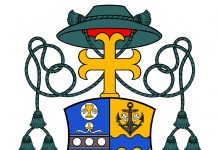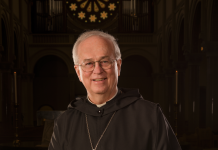Column by Justin Kirkland
One of my favorite Christmas carols is Adeste Fideles, the Latin translation of the well-known Christmas carol “O Come, All Ye Faithful.” The song, written by a lay Catholic Englishman during persecution, simply, yet profoundly, invokes a flood of joy and truth. The joy of knowing that He is finally here, the long awaited Emmanuel, God with us, spoken about by the Old Testament prophets.
In the first verse, “O come, all ye faithful, joyful and triumphant” and “born the King of Angels,” tells us from the start how simple and easy it is for us. We must first and foremost, come. The faithful, with our baggage, with our vices, and with our sin, must be joyfully present to who is among us. Though we are not at the original manger looking at Him and we may not fully understand how this newborn could possibly be a King of Angels, it doesn’t seem to matter. The long awaited King is finally here! He is in our midst!
The refrain then tells us where to go from here, Venite, adoremus, literally meaning, “Come, let us adore.” For Catholics, we use the term adore only to characterize the right or correct worship towards God alone. We venerate the saints and ask them for their intercession, but for God, it is specific. To adore anything else would be idolatry. This child, this King, must then be something more than just a human child. He would have to be divine to be given such reverence. In this sudden Revelation, Venite, adoremus is repeated. Being at a loss for words, this is the only thing which can be done before someone so glorious.
With all of that said, the Incarnation is something that absolutely baffles my mind. To think that the Logos, or the Word of God now in flesh, would come here to this sinful and messed up world sounds sort of asinine. Even more, that He would want to be with us, that He would want to be so close to us as to dwell with us, all because he loves us is insane!
This radical love culminates into the divine person who is Jesus Christ, asking us to look upon him in adoration, though now not in flesh as we are, but in the Holy Eucharist. In this reception the great act of metanoia, or conversion, is able to take place. In this active participating we reorient ourselves away from the selfishness of the world and encounter in prayer this God-Man. This turning, this conversion of heart, is where the simplicity of the Incarnation becomes more difficult. Because if we believe in the Incarnation, and that Christ is still present with us now, we must become like Him in every way possible, namely through becoming saints, or divinization.
Throughout this Christmas season, my prayer for all of us is simply this, that we will go and adore Him and allow Him to lift us out of the darkness which we seem to hold onto. That during Christmas Mass we can look at the Eucharist just as we would look at the baby in the manger, or the man on the cross, with awe and in splendor of a God who desires for us to be joyfully united with Him. Venite, adoremus Dominum.
Justin Kirkland has a Bachelor’s degree in Theology from Franciscan University of Steubenville and is pursuing a Master’s degree in Theology. He is employed in the Diocese of Altoona-Johnstown Offices of Communications, Human Resources, and Youth Protection.































